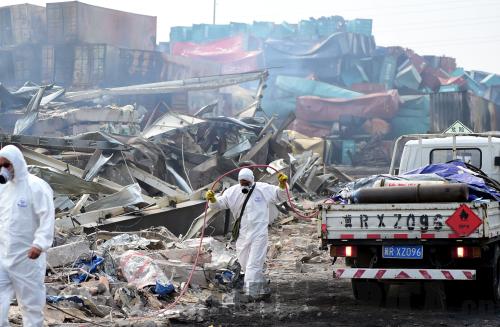| 
Rescuers clean up debris at the warehouse explosion site in Tianjin on August 24
Less than a month after two deadly explosions ripped through a warehouse in the Binhai New Area of Tianjin, a municipality in north China, on August 12, schools in the area reopened on September 1.
Soon after the blasts, which killed 165 people and left eight missing, as of September 14, the local government and rescue workers labored hard to ensure that the over 300 schools in the area, including new primary schools and kindergartens, could begin the new semester in time.
The warehouse had been storing large amounts of toxic chemicals, including sodium cyanide. The explosions destroyed nearby apartment blocks and affected many primary and middle schools.
Back to school
The No.2 Elementary School served as a temporary shelter for the homeless after the mishap. On August 20, they were relocated and the local government repaired the buildings affected and cleaned the surrounding area.
A notice board was put at the entrance of the school, detailing the ongoing repairing, cleaning and environmental monitoring.
A man, who gave only his surname, Wang, read the notice carefully and explained it to his daughter, a second-grader at the school.
"They will update the environmental monitoring result every day," he said. "It helps alleviate parents' worries about the possible negative effects of the blasts on children."
Liang Chunguang, a fifth-grade teacher and psychological counselor at the No.2 Elementary School, said some students had looked unhappy at the beginning. "But after we played games and shared stories, they looked a lot happier," Liang added.
The Tianjin Teda Maple Leaf International School is just 2.7 km from the warehouse. When the explosions occurred, there were 800 boarders in the school. All of them were terrified.
"I was horrified that night and haven't slept well since then," said Yu Ying, one of the boarders. "I felt better when we played games together after class [on September 1]. It felt nice to be in a big group."
Liu Changyong, a school management official, said more such classes will be held in October as psychological counselling is needed for the students.
Fifty psychologists from universities and hospitals in Tianjin have been sent to the seven schools affected to help out.
Returning to normal
Tianjin's water supply was cut off immediately after the explosions to ensure people's safety.
"The cyanide levels in the samples from rivers and offshore were below toxic levels," said Deng Xiaowen, head of the city environment monitoring center. "The air outside the core zone has also tested within national standards."
Though cyanide was detected in the soil near the blast site, its concentration is within national levels, said Tian Weiyong, Director of the Ministry of Environmental Protection's Environment Emergency Center, on August 22.
Sixteen of the 73 soil samples collected within a 5-km radius of the blasts' epicenters were found to contain cyanide but none exceeded the national standard, Tian said.
Ensuring safety
Tianjin has conducted safety audits of 275 companies since the explosions. Seventy were found to have safety problems and had their operations suspended, according to Zhang Yong, head of the Binhai New Area.
The train station in the area was destroyed. But services resumed in September.
On August 12, five state-owned property developers in the port city announced they have formed an alliance to purchase apartments affected by the blasts from willing residents and re-sell them after renovation. Over 17,000 households were affected in varying degrees.
"The surroundings of these affected complexes will be revamped with greenery. Also, there will be no storage yard or chemicals at the blast site once it's covered in green," said Di Da, Chairman of the Tianjin Real Estate Group, one of the five developers.
The State Council, China's cabinet, has assigned five teams to investigate the cause, accountability and institutional loopholes that led to the explosions. The findings will be published once all evidence has been submitted to the State Council.
On August 27, China's top procuratorate, the Supreme People's Procuratorate (SPP), announced it was investigating the officials and port executives whose negligence allegedly led to the explosions.
The officials under investigation include Wu Dai, head of the Tianjin Municipal Transportation Commission, and Zheng Qingyue, President of the Tianjin Port (Group).
Wang Jinwen, a senior official with the Ministry of Transport, is also being investigated for suspected abuse of power.
The SPP found Wang had helped Tianjin Dongjiang Port Ruihai International Logistics, owner of the controversial warehouse, illegally pass safety evaluations and obtain approval to handle hazardous materials.
On September 4, the local government said an ecological park would be built at the site of the blasts. The 24-hectare park will have a monument to remember the people who lost their lives in the accident.
Zhang, head of the Binhai New Area, said 365 enterprises had registered in the district between August 13 and 20, soon after the explosions. Of them, 17 are foreign-funded enterprises.
"This reflects that enterprises at home and abroad still have confidence in the development of the Binhai New Area," Zhang said.
About 1,700 enterprises are estimated to have been affected by the blasts. The government will help the companies affected resume production as soon as possible, Zhang said. |